According to the School of Ocean and Earth Science in Tongji University, the public elective course "Science and Culture", which is taught by academician WANG Pinxian, will be offered in the second semester of the academic year 2020 to 2021. After four years of elaborate preparation, this popular course will once again be available to all students and teachers. The biweekly course includes eight lectures, lasting 16 hours in total, starting at 18:30 on Wednesday evenings at Siping Campus.
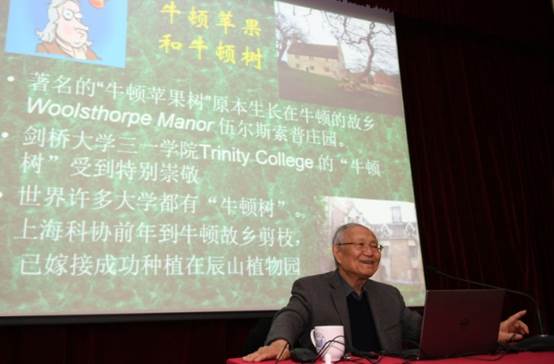
Academician WANG Pinxian giving a lecture on "Science and Culture"
It is reported that all the eight lectures of this course will be given by academician WANG, including "the Emergence of Science", "Science and Horizon", "Human Beings and the Ocean", "Science and Curiosity", "Innovation and Education", "Oriental and Occidental Cultures ","the Official Language of Science" and "the Controversy of Global Warming". Academician WANG tries to share his understanding of culture as a scientist and ponders epistemological issues through narrating interesting scientific stories. He hopes to enrich the cultural ambience of the school, to stimulate students' enthusiasm for science and cultivate innovative thinking.
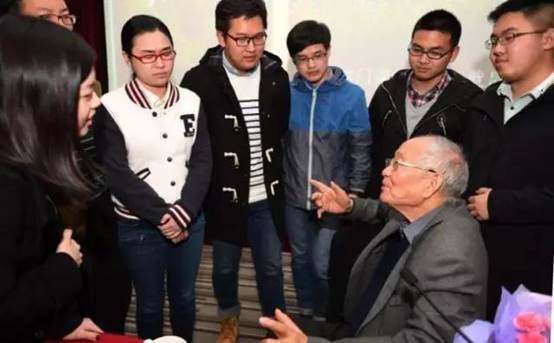
Academician WANG Pinxian communicating with students
The public elective course about science and culture dates back to 2017. Back then, academician WANG Pinxian, now a 80-year-old who has been on the front line of deep-sea research, took the initiative to launch a public elective course called "Science, Culture and the Ocean". He gave six lectures, of which two were offered respectively by two famous experts whom he invited: DING Kang and QIAN Xuhong. WANG Pinxian tried to trigger young students' re-understanding of the relationship between science and culture, to inspire and motivate young people to cultivate their innovative consciousness inventiveness on campus, and to devote themselves to research and innovation. Once the course was launched, it was warmly welcomed by all the students and the faculty. The lecture hall was filled to it full capacity for each lecture. The audience consisted not only of undergraduates, postgraduate and doctoral students, but also many teachers with their young children. At the end of each lecture, the course would receive a large number of testimonials from students on the interactive platform, demonstrating their knowledge and reflections on the content of each lecture.
Academician WANG Pinxian once stated the purpose of this course as, “to build a bridge between science and culture, even if it is just a small wooden bridge in the corner of a university campus." He believes that it is our responsibility to build a bridge between contemporary science and Chinese culture, to unveil the cultural essence of natural science, and to endow traditional culture with the spirit of science. The integration of natural science, social science, culture and art is the best bedrock or foundation for scientific innovation.
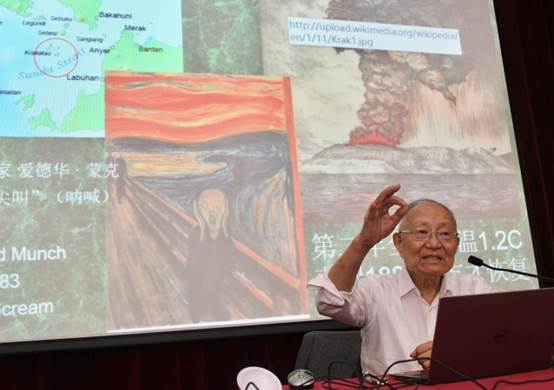
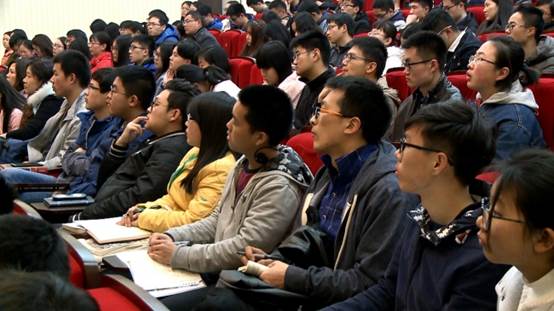
Academician WANG's lecture and the audience
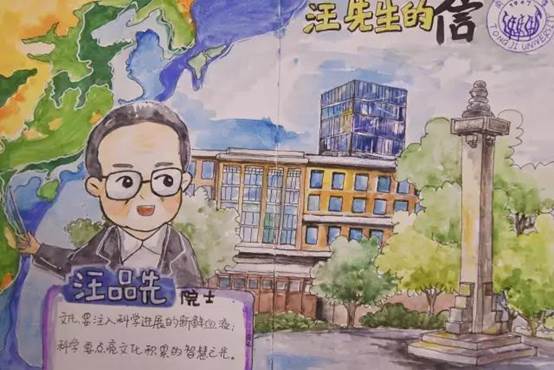
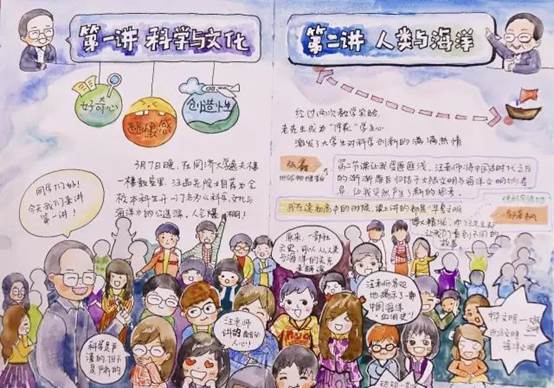
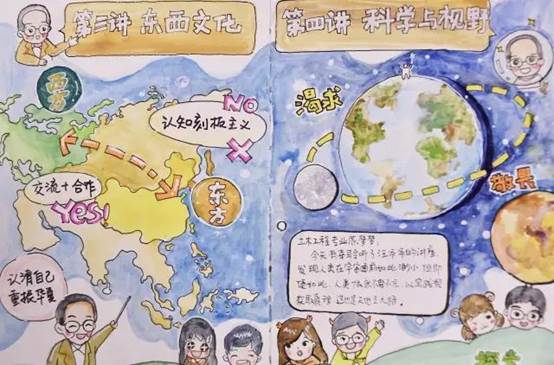



Students' feedback on the course
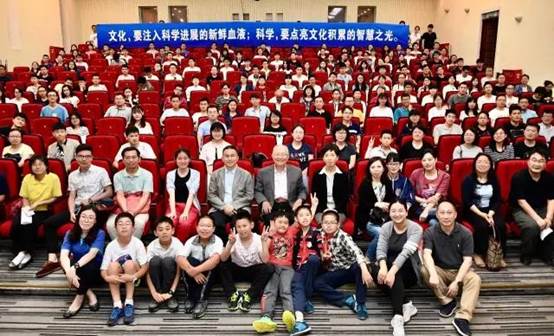
Attachment: "Science and Culture" Course Guide
Lecture 1: The Emergence of Science
Science is fun and useful. The emergence of science was not driven by application, but rather as a cultural pursuit that accompanied the Renaissance in Europe in the 16th Century. In fact, all the major ancient civilizations in history have achieved a certain level of scientific development. However, there has always been a gap between science and traditional Chinese culture, which may be the answer to "Needham's Grand Question: Why didn't China have a scientific revolution considering its early scientific accomplishments? "
Lecture 2: Science and Horizon
Vision is the main way to perceive the environment, but different perspectives can produce very different effects. Technological developments can broaden human horizons, but cannot provide direct insight into the inner process of science, which is the greatest weakness of current scientific cognition. The boundless universe consists of overlapping processes at different time scales, but human longevity limits the ability to discern on these diverse time scales. Therefore, anthropocentrism has become the great enemy of scientific progress.
Lecture 3: Human Beings and the Ocean
Social history can also be interpreted in terms of the relationship between human beings and the ocean. In the 16th century, humans entered the sea vertically. The maritime civilization originated from the Aegean Sea and gradually conquered the world, defeating the East Asian Civilization which originated from the continent or was largely land-based. In the 21st century, human beings are entering the sea horizontally from different parts on different continents. It is predicted that the result of the "Great Rejuvenation of the Chinese Nation" will be the transformation of the continental civilization, and a "younger China" will become a civilization combining the ocean and the continents.
Lecture 4: Science and Curiosity
Religion is born out of fear. Science arises from curiosity. Real, original innovation is rare because it can only develop on the basis of culture. There are two drivers of innovation: one internal and the other external. The curiosity of scientists, their sense of achievement and the social need are the main factors that influence the development of science. Over-emphasis on the fame and benefit of science can easily lead to academic corruption. Just like the arts, science can attract hobbyists and self-learners. However, we can hardly find any amateurs who volunteer to popularize science.
Lecture 5: Innovation and Education
China's educational system was generally introduced from the West together with modern science, and therefore the conflict that arose with traditional education has become an eternal topic for a century. Essentially, it is a contradiction between the Confucian culture of discourse education and innovation education; formally, it is the difference between examination-oriented education and heuristic education. Similar contradictions are reflected in scientific research, and there is an urgent need to transform from "borrowing from outside" to "deep processing" or in-depth analysis.
Lecture 6: Oriental and Occidental Cultures
Oriental and occidental civilizations, originating from continental and maritime economies respectively, have profoundly influenced scientific thinking. For more than a century, the academic circles in our country have been swinging between "traditional conservatism" and "following the west", and the frequent change has caused cultural perplexity There is an urgent need to resolve this dilemma through cultural reflection, to find out the pros and cons of Eastern and Western cultures. For domestic development, it will help to build national self-confidence; for diplomatic development, it will help to clarify international public opinion and to lay the cultural foundation for the rejuvenation of China.
Lecture 7: the Official Language of Science
English was not the lingua franca of the world until World War II. Chinese was once the lingua franca of East Asia. Now there are more than 5000 languages spoken worldwide, while the number of native speakers of Chinese is the largest. Chinese characters have long been criticized, but they are the cultural bond connecting the Han nationality. The prospects for greater application of Chinese characters will improve as technology develops. Bilingual education is now widely promoted in China. Meanwhile, we need to increase the "currency value" of Chinese in science to strive towards and enhance the soft power of China.
Lecture 8: The Controversy of Global Warming
Global warming is the first international political struggle sparked by a scientific issue, reflecting that, for the first time, the activities of a single species threatened the planet's living environment. But 50 years ago, what people worried most about was the academic propaganda of the "nuclear winter". The contradiction between different periods reflects the immaturity of scientific understanding. In the current search for sustainable development, the "doomsday culture" in the West and the concept of "unity of man and nature" in the East can both have academic prowess
Source: https://news.tongji.edu.cn/inf